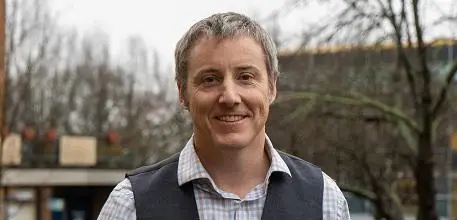Cultivating child health research: meet Professor Mark Johnson
Professor Mark Johnson is a research-active neonatologist in Southampton.
He has recently started a jointly funded position across the University of Southampton and University Hospital Southampton (UHS).
His new role as a Professor of Child Health is seeking to bring greater coherence to paediatric, neonatal, and prenatal research. This will build on existing strengths in Southampton.
He shares his background, vision and opportunities in child health research.
How have you arrived at this point in your career?
My journey started right here. I was a medical student in Southampton before moving into paediatrics and specialising in neonatology. In 2015, I completed a PhD in neonatal nutrition and implementation science. This focused on how to use practice change techniques to deliver better nutritional care for premature babies.
Since then, I’ve worked as a consultant neonatologist, primarily at the Princess Anne Hospital, while continuing my research. Through NIHR Southampton Biomedical Research Centre (BRC) funding, I explored early-life nutrition and growth. More recently, I have been part of the UHS Research Leaders programme.
This new role is an exciting opportunity to combine my clinical work with broader research leadership, whilst continuing my work on neonatal nutrition.
What do you see as the biggest challenges in child health research?
One of the main challenges is that researchers between organisations often work in silos.
There is strong research taking place across three schools in the University’s Faculty of Medicine. There are also lab-based scientists working here and in the wider University.
UHS also hosts Southampton Children’s Hospital, a regional centre with general and specialist paediatricians and allied health professionals who are also undertaking clinical research in their areas.
Across all these groups there can be limited awareness of what each other are doing, the vast range of skills and expertise available, and the potential for collaboration. This is particularly the case among NHS clinicians engaged in research who aren’t formally connected to the University.
The potential for collaboration is huge, but it requires coordination.

How do you hope to address this challenge?
My goal is to act as a bridge, connecting people who are already doing fantastic work.
Southampton has major strengths in nutrition and metabolism research, respiratory health, allergy, infectious diseases, genomics, as well as the developmental origins of adult disease.
We also have a growing number of non-medical researchers, including academic dietitians, pharmacists, physiotherapists, psychologists and nurses. These bring valuable perspectives to child health research.
My role is to bring these groups together. I want to encourage interdisciplinary projects, grant applications and publications and ensure research directly informs clinical practice in child health.
A key ambition is to elevate Southampton’s reputation as a leader in child health research by presenting it as a cohesive and recognised area of excellence.
One of our strengths lies in our life-course approach. This enables us to examine child health within the broader context of development. This goes from prenatal stages through to adolescence and beyond.
By capitalising on this perspective, we can highlight our expertise across multiple disciplines.
What are your interests outside of work?
I enjoy running and usually cover up to seven miles two to three times a week whenever I get the chance.
I'm also a keen gardener and like doing DIY at home. I've recently taught myself to weld and was pretty pleased I was able to fix a chair that recently broke at home. (Though, there's definitely a technique to it!)
Most importantly, I’m a dad-of-two, which keeps me busy outside of work. I’m a keen music listener and like to discover new bands. My daughters are teenagers and I enjoy taking them to see live music.